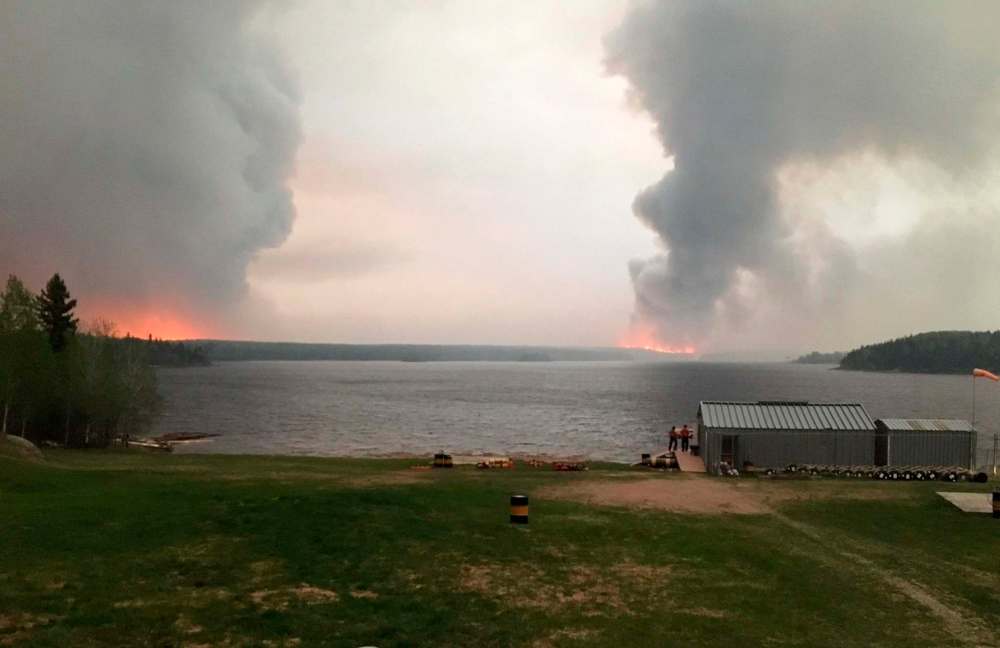Wildfires in northern Manitoba displace more than 1,000
Advertisement
Read this article for free:
or
Already have an account? Log in here »
To continue reading, please subscribe:
Monthly Digital Subscription
$0 for the first 4 weeks*
- Enjoy unlimited reading on winnipegfreepress.com
- Read the E-Edition, our digital replica newspaper
- Access News Break, our award-winning app
- Play interactive puzzles
*No charge for 4 weeks then price increases to the regular rate of $19.00 plus GST every four weeks. Offer available to new and qualified returning subscribers only. Cancel any time.
Monthly Digital Subscription
$4.75/week*
- Enjoy unlimited reading on winnipegfreepress.com
- Read the E-Edition, our digital replica newspaper
- Access News Break, our award-winning app
- Play interactive puzzles
*Billed as $19 plus GST every four weeks. Cancel any time.
To continue reading, please subscribe:
Add Free Press access to your Brandon Sun subscription for only an additional
$1 for the first 4 weeks*
*Your next subscription payment will increase by $1.00 and you will be charged $16.99 plus GST for four weeks. After four weeks, your payment will increase to $23.99 plus GST every four weeks.
Read unlimited articles for free today:
or
Already have an account? Log in here »
Hey there, time traveller!
This article was published 23/05/2018 (2763 days ago), so information in it may no longer be current.
More than 1,000 people in Pauingassi First Nation and Little Grand Rapids First Nation, who are threatened by forest fires, will be flown into Winnipeg when the smoke lifts enough for flights to get in and out.
The growing crisis has drawn assistance from the military, which has mobilized a pair of Hercules transport aircraft and a Chinook helicopter. It is “a situation that is evolving quickly,” a public affairs officer for 1 Canadian Air Division said in an email Wednesday evening.
Red Cross spokesman Jason Small said 80 residents of Little Grand Rapids made it out Tuesday night before darkness and smoke ended the flights. They’re staying in Winnipeg hotels.

The province said another 800 were still waiting in Little Grand Rapids at mid-day Wednesday. There were 300 residents to be transported from nearby Pauingassi, a community about 280 kilometres northeast of Winnipeg that doesn’t have an airstrip, Small said.
“The issue right now is smoke is making it difficult to get into the community. The plan is to use helicopters and float planes,” Small said. “The smoke, everything is contingent on that.”
The Chinook was scheduled to take 60 people to Red Lake, Ont., from Little Grand Rapids (one of the Hercules transports would then be used to bring them to Winnipeg). The helicopter would then take 30 people to the city from Pauingassi.
In Ottawa, the federal Liberals activated the government operations centre Tuesday, which is the central co-ordination hub for natural disasters and terrorist attacks.
“Officials were on the phone right through the night,” Indigenous Services Minister Jane Philpott said Wednesday.
Defence Minister Harjit Sajjan said he signed off on a request for help.
“We allow the military to actually do the appropriate planning for it, to make sure that we can achieve that mission and move those persons out safely,” he said.
The fire, which had consumed almost 50,000 acres, was within five km of Pauingassi by Wednesday afternoon.
“There are reports from (Little Grand Rapids) that some homes have been lost to the fire, but the exact number has not been confirmed at this time,” provincial officials said Wednesday morning in the daily forest fire report.
Liberal MLA Judy Klassen, who represents the north, said her husband and seven other men working at a water treatment plant at Little Grand Rapids were flown out by charter plane around 12:45 p.m.
He could see the fire as they took off, she said.
“He feels horrified. He tried to get more people on the plane. He feels horrible for leaving them behind,” Klassen said. “It’s quite disturbing. They’ve lost houses — that should be signal enough.
“They want out. They want out, and they want it yesterday,” she said from Ottawa, where the resident of St. Theresa Point First Nation is accompanying a group rallying against methamphetamine abuse and addiction problems in northern Manitoba.
Klassen recently raised the alarm about northern residents who had been moved to Winnipeg during earlier emergencies. She said some had been convinced to use meth and other drugs. Drug dealers close in quickly on young people, she said.
Instead of a hotel, “Take us to a park and put us in tents, we’re used to that. We’re able to watch our kids,” while enjoying privacy and seclusion, she said.
NDP MLA Nahanni Fontaine echoed those concerns, saying better supports for fire evacuees are needed after reports last year of northerners being targeted by meth peddlers while in Winnipeg.
Philpott noted there were issues with response times and temporary housing during last August’s evacuation of roughly 6,500 people from the Island Lake area. “There were lessons learned from last year’s experience that have allowed us to respond even more rapidly than last year,” she said.
Meanwhile, the community of Ashern, which is 180 km northwest of Winnipeg, was on an evacuation alert. So far, 27,000 acres have been lost, as ground crews and water bombers fight large fires.
Infrastructure Minister Ron Schuler said Wednesday afternoon it appeared the wind direction had so far spared Ashern and Highway 6.
Schuler repeatedly said he wouldn’t make the final call of where resources get deployed should Manitoba have more fires burning than equipment to fight them. “We allow our professionals to make those decisions,” he said.
Fires near Sapotaweyak Cree Nation are being held, but the community 400 km northwest of Winnipeg will remain evacuated, the province said.
Three new fires started Tuesday, the province said, and the total number of fires in Manitoba this year is 166, well above the average of 103 for this date.
— with files from Larry Kusch
nick.martin@freepress.mb.ca


